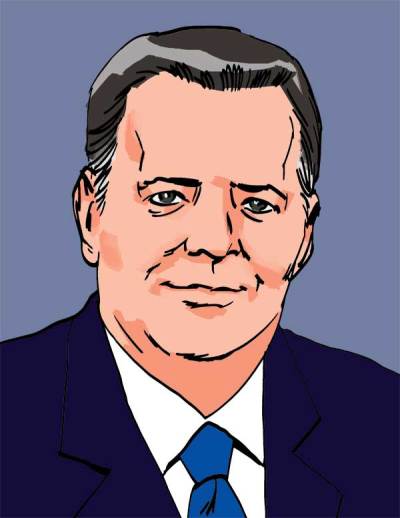Neil Postman Predicted 'Trumpocalypse' 30 Years Ago

About 10 days before Donald Trump overwhelmed Ted Cruz in Indiana, as I was rearranging some books in my library (to make room for some recent acquisitions), I came across a book, Neil Postman's Amusing Ourselves to Death. Public Discourse in the Age of Show Business, which I remember making quite an impression on me when it was originally published in 1985.
Postman, at the time a professor of communication arts and sciences at New York University, had already published fifteen books. Amusing Ourselves to Death was destined to be the most memorable and insightful.
As I casually began to peruse the book, memories came flooding back to me of just why I was so sobered by Postman's insights in 1985. I found myself sitting down in my study and virtually re-reading the entirety of this deceptively small volume. The more I read the more dumfounded I was by Postman's prophetic insights into what was then America's future and is now too often a painful description of America's present and may very well portend an even more depressing future.
Postman started off his book by contrasting the two most dystopian visions of modern civilization's future, George Orwell's Nineteen Eighty-Four (1949) and Aldous Huxley's Brave New World (1932).
Postman points out that contrary to popular and even "educated" opinion, Orwell and Huxley "did not prophesy the same thing." Orwell's dark vision of the future featured a totalitarian state ("Big Brother") that suffocatingly extended to managing and controlling every area of each person's life through enormous advances in technological surveillance.
While Orwell envisioned a significantly technologically advanced Soviet-style police state on steroids, Postman observed that Huxley envisioned a future where people came to "adore the technologies that undo their capacities to think." (p. vii).
Postman's contrast of the two dystopian visions of the future is chilling:
"What Orwell feared were those who would ban books. What Huxley feared was that there would be no reason to ban a book, for there would be no one who wanted to read one. Orwell feared those who would deprive us of information. Huxley feared those who would give us so much that we would be reduced to passivity and egoism. Orwell feared that the truth would be concealed from us. Huxley feared the truth would be drowned in a sea of irrelevance. Orwell feared we would become a captive culture. Huxley feared we would become a trivial culture preoccupied with some equivalent of the feelies . . ." (p. vii).
Postman then concludes that Amusing Ourselves to Death "is about the possibility that Huxley, not Orwell, was right." (p.viii).
Postman, writing more than a decade before the Internet revolution almost instantaneously transformed American culture, argued in Huxley's vision "culture becomes a burlesque."
Channeling Huxley's futuristic vision, Postman asserts "that in the age of advanced technology:"
"When a population becomes distracted by trivia, when cultural life is redefined as a perpetual round of entertainments, when serious public conversation becomes a form of baby-talk, when . . . a people become an audience and their public business a vaudeville act, then a nation finds itself at risk, culture-death is a clear possibility" (p. 135-136).
Postman believed in 1985 that because of the pervasive, perverse and pernicious influence of television that Huxley's prophecies were "well underway to being realized" because Americans were even then "engaged in the world's most ambitious experiment to accommodate itself to the technological distractions made possible by the electric plug." (p. 156).
How much more depressed would Postman have been if he could have foreseen the rise of the Internet — "an event so swift and pervasive its political effect is only now beginning to be understood" (Andrew Sullivan, "America Has Never Been So Ripe for Tyranny," New York Magazine, May 2, 2016).
Postman has made the very telling point, quite startling to most Americans with their blind faith in progress, that all "technology comes equipped with a program for social change" and "to maintain that technology is neutral, to make the assumption that technology is always a friend to culture is, at this late hour, stupidity, plain and simple" (p. 157).
Several people have asked me recently, how do you explain Americans' fascination (or is it fixation?) with celebrities, whether it is Prince or Donald Trump? Clearly, the recently deceased Prince was a marvelously talented entertainer and Donald Trump is a remarkably gifted marketer who has mastered the language and communication skills of social media and converted them into a successful hostile takeover of the Republican Party. That explains the how, but not the why? Postman provides us with an answer.
The Internet has changed the basic DNA of our culture, including our social and personal relationships and our information access. It has radically democratized communication, while at the same time condemning any effective editorial or verifying filter as the unwelcome control of a hated elite. Consequently, we are being engulfed not only in a sea of moral relativism, but information relativism as well. The immersion of our culture in Internet speak has brought us perilously close to a denial, if not a revocation of the late, great, Senator Daniel Patrick Moynihan's statement that "you are entitled to your own opinions, but you are not entitled to your own facts." Now, opinions too often masquerade as facts, and fewer and fewer know the difference and increasingly fewer care.
As Postman pointed out, Huxley was trying to warn the future "that what afflicted people in Brave New World was not that they were laughing instead of thinking, but that they did not know what they were laughing about and why they had stopped thinking (p.163)."




























